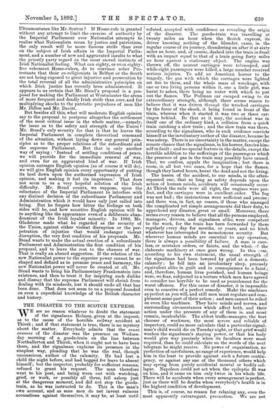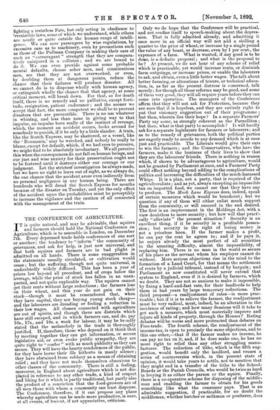THEDISASTER TO THE SCOTCH EXPRESS.
WE see no reason whatever to doubt the statement of the signalman Holmes, given at the inquest, as to the cause of the horrible railway accident at Thirsk ; and if that statement is true, there is no mystery about the matter. Everybody admits that the causes causans of the disaster was the presence on Wednes- day morning of a goods-train on the line between Northallerton and Thirsk, when it ought not to have been there, and the signalman explains its presence in the simplest way, pleading that he was the real, though unconscious, author of the calamity. He had lost a child the night before, and had begged for leave to absent himself ; but the inspector, probably for sufficient reasons, refused to grant his request. The man therefore went to his post, and being worn out with watching, grief, or work, or possibly all three, fell asleep just at the dangerous moment, and did not stop the goods- train, as he was instructed to do. This is the man's own account, and as sane men do not invent ruinous accusations against themselves, it may be, at least until refuted, accepted with confidence as revealing the origin of the disaster. The goods-train was travelling at twenty miles an hour when the Scotch express, its driver knowing nothing of the blunder, came, in the regular course of its journey, thundering on after it at sixty miles an hour, and, of course, dashed into the train in front with an impact equal to that of a train going forty miles an hour against a stationary object. The engine was thrown off, the nearest carriages were telescoped, and while eight passengers were killed, a large number received serious injuries. To add an American horror to the tragedy, the gas with which the carriages were lighted set fire to them, and the whole mass of wreckage, with one or two living persons within it, one a little girl, was burnt to ashes, there being no water with which to put out the flames. The Pullman car escaped owing to its extraordinary strength, although there seems reason to believe that it was driven through the wrecked carriages by the force of the shock, it being found in front of the train, whereas when it started it was two or three car- riages behind. Be that as it may, the accident was in itself one of the ordinary kind, a collision from a quick train catching a slow train ; and the slow train was there, according to the signalman, who in such evidence convicts himself as the involuntary author of the disaster, because he was asleep. There is no uncertainty in the matter, except the remote chance that the signalman, in his horror, fancies him- self in fault ; and no special feature in the details, except the horrible addition to the sufferings of the passengers which the presence of gas in the train may possibly have caused. That, we confess, appals the imagination ; but there is room, in all but two cases, for a hope that the flames, though they lasted hours, burnt the dead and not the living.
The lesson of the accident, to our minds, is the often- repeated one, that so long as safety depends upon the action of human minds, accidents will occasionally occur. At Thirsk the rails were all right, the engines were per- fect, and the carriages were in excellent order. The fog was not bad ; the instructions were sufficient and precise ; and there was, in fact, no reason, if those who managed the complicated yet simple arrangements did their duty, to apprehend any disaster, great or small. Moreover, there seems every reason to believe that all the persons employed, managers, drivers, and signalmen alike, were competent to the work, for the train has been forwarded by them regularly every day for months, or years, and no hitch whatever has interrupted its monotonous security. But wherever human minds are essential to any operation, there is always a possibility of failure. A man is care- less, or mistakes orders, or faints, and the whole "sf the elaborate machinery at once goes wrong. In this case, according to his own statement, the usual strength of the signalman had been lowered by grief at a domestic calamity ; he fell into an involuntary sleep, precisely equivalent alike in guilt and in consequences to a faint ; and, therefore, human lives perished, and human beings were, we fear, subjected to a torture which men have agreed to consider too horrible to be used as punishment for the worst offences. For this cause of disaster, it is impossible even to conceive of a perfect remedy. Make the machines as perfect as you will, and still men must regulate and com- plement some part of their action ; and men cannot be relied on even like machines. They have minds and nerves, and surrounding circumstances which affect both, and their action under the pressure of any of them is, and must remain, incalculable. The ablest traffic-manager, the best chooser of workmen, the most severe and reliable of inspectors, could no more calculate that a particular signal- man's child would die on Tuesday night, or that grief would weaken the signalman's staying power, or that his body would give way precisely when its faculties were most required, than he could calculate on the words of the next telegram he might receive. No power of organisation, no perfection of carefulness, no range of experience, would help him in the least to provide against such a future contin- gency, or against any one of the thousand others which may spring from purely accidental mental or bodily col- lapse. Napoleon could not act when the epileptic fit was on him, and it came on him only twice in his whole life. There will be accidents when every arrangement is perfect, just as there will be deaths when everybody's health is in the highest condition of development.
This is, of course, no reason for relaxing any, even the most apparently extravagant, precaution. We are not fighting a resistless Fate, but only acting in obedience to `rresistible laws, some of which we understand, while others are nearly or quite outside the human range of intelli- gence. We can save passengers by wise regulations, by excessive care as to machinery, even by precautions such as those of the Pullman Company in making their cars of such an " extravagant " strength that they are compara- tively uninjured in a collision ; and we are bound to do it. We can even provide against some probable mental defaults, choose sober men, and conscientious men, see that they are not overworked, or even, by doubling them at dangerous points, reduce the chance that their failures will produce disaster. All we cannot do is to dispense wholly with human agency, or extinguish wholly the chance that that agency, at some critical moment, will break down. For that, as for death itself, there is no remedy and no palliative, except forti- tude, resignation, patient endurance ; and the sooner we accept that fact, the more competent we shall be to prevent disasters that are preventible. There is no use whatever in whining, and less than none in giving way to that impulse, an impulse born really of the instinct of revenge, which, the moment an accident occurs, looks around for somebody to punish, if it be only by a little slander. A train, like the Scotch Express, may be shattered, or a vessel, like the ' Roumania,' may be wrecked, and nobody be really to blame, except for default, which, if we had eyes to perceive, we might find to be absolutely involuntary. We all perceive this when the consequences do not fall on human beings, and our just and wise anxiety for their preservation ought not to be fostered until it destroys either our courage or our judgment. Let the strictest investigation be always made, but we have no right to leave out of sight, as we always do, the one chance that the accident arose even indirectly from no personal negligence in any human being. There are hundreds who will dread the Scotch Express for months because of the disaster on Tuesday, and yet the only effect of the accident upon the probabilities must be perceptibly to increase the vigilance and the caution of all connected with the management of the train.























































 Previous page
Previous page